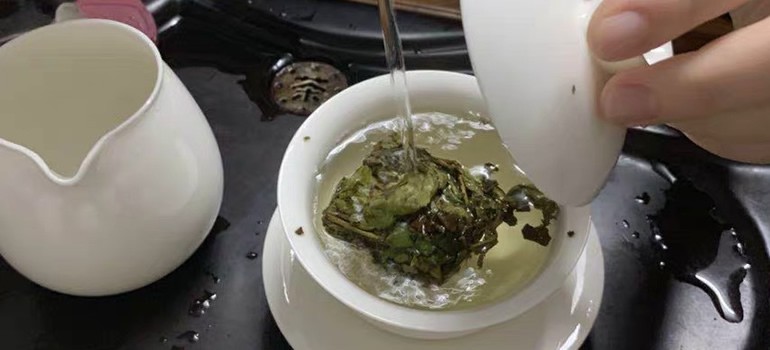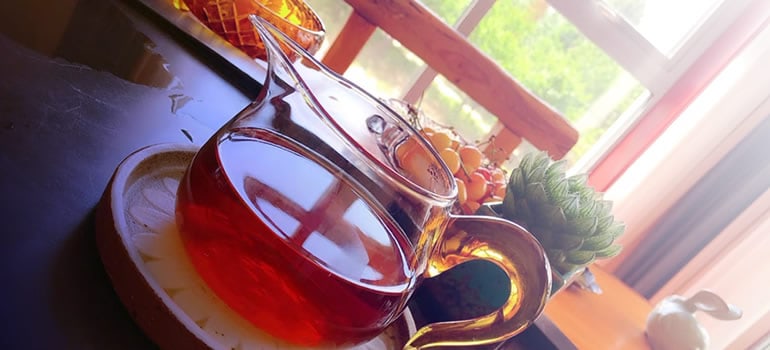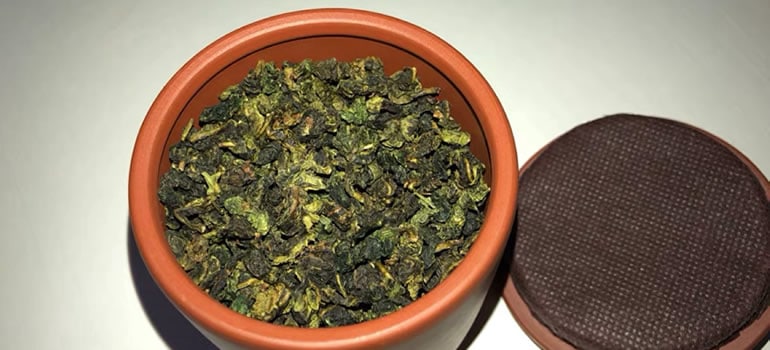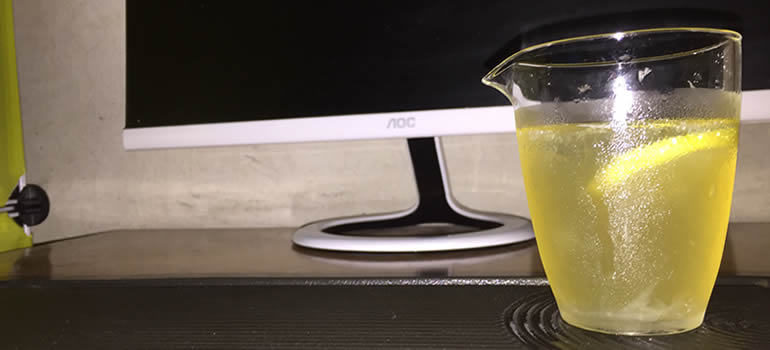When we talk about jasmine tea, we may think that it is made with jasmine leaves.
However, jasmine tea is a tea blend.
A tea blend is a combination of different teas. And by combining different tea types, we can experience and enjoy a new and unique mixture of flavors, aromas.
The standard base, which is used for jasmine tea is green tea. Other types of tea that are used as a base for it are black tea, white tea, and oolong. These types of tea are then flavored with jasmine blossom petals that give its unique flavor.
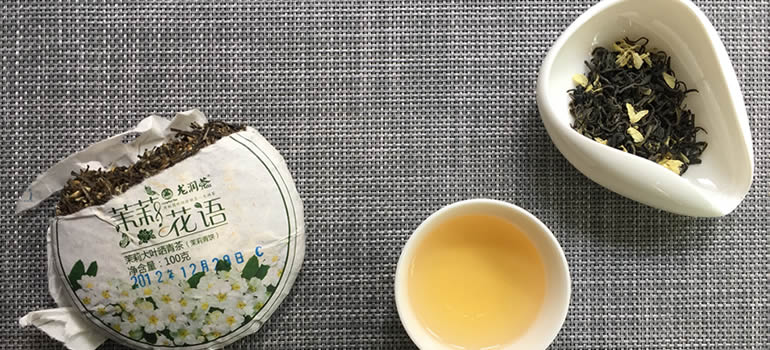
Can jasmine tea keep you awake? Jasmine tea can contain varying levels of caffeine. Caffeine is a natural stimulant that can increase alertness and keep you awake. Jasmine scent, however, has calming properties. The degree to which jasmine tea will keep you awake will depend on when you drink it and how much caffeine it contains.
As you can see, jasmine tea may have some contradictory properties at first reading. This is why I will get into further detail on how jasmine tea will affect your mood and energy levels. So read on.
Will Jasmine Tea Keep You Awake?
Sometimes you may just want to have a cup of tea that will give you a little extra boost throughout the day. Or you may need some extra energy to keep you going in the evening if you are burning the midnight oil.
Other times, you may just want to sip a hot cup of tea and enjoy a nice and relaxing evening without worrying about whether or not your tea will ruin your sleep later.
And you may wonder what will be the effect of jasmine tea: will drinking it keep you awake or not?
Jasmine tea can keep you awake for longer and make you more energized. But in order to properly answer that we need to explore what ingredient will keep you awake.
One of the best stimulating substances is caffeine.
Why Does Caffeine Keep You Awake?
Caffeine keeps you more focused and awake by playing a little trick on your brain.
You see, a specific chemical is produced in our body – called adenosine – which is making us feel tired and sleepy as it binds to the adenosine receptors we have in our body and brain.
However, caffeine can bind to the same receptors, too.
That way, caffeine not just blocks adenosine from making us feel tired, but it also energizes but makes us more alert and awake.
Caffeine has a long half-life, which is about five hours (That time may vary significantly from person to person, though). This means that if you consume 40 mg of caffeine now, after five hours, you will have 20 mg of caffeine in your body.
And high amounts of caffeine can interfere with your sleep quality. Even if the energy-boosting effect of caffeine has passed.
With time your body will start to develop a tolerance to caffeine. An increased tolerance will mean that you will need to consume more and more caffeine in order to achieve the same effect.
Does Jasmine Tea Contain Caffeine?
Jasmine, on its own, doesn’t contain caffeine.
However, as we established, jasmine tea is a tea blend. The caffeine content in jasmine tea will depend on the base tea that has been used.
So the right question to ask would be: Do the rest of the ingredients in this tea blend contain caffeine?
Teas Used for the Base
The typical base for jasmine tea is green tea. (Also white, black and oolong tea are used.)
All four of these types of tea comes from the same source: the Camellia Sinensis tea leaf.
For many, this may sound really strange. If they are made of the same kind of leaves and buds, then, why do we have different names for them?
The answer to that would be the processing method.
- White tea has the lowest amount of processing;
- Green tea goes through pan-frying or steaming;
- Oolong tea undergoes partial oxidation; and
- Black tea is fully oxidized.
Camellia Sinensis leaves do contain caffeine, so teas made with it will contain caffeine, as well. This makes all four of the teas mentioned above caffeine-rich. In fact, black tea has some of the highest amounts of caffeine in it.
The more processing and oxidation the leaves undergo the highest caffeine content. Additionally, the actual caffeine content of the tea will depend on the amount of tea used, the brewing and steeping time, and water temperature.
How Long Can Jasmine Tea Keep You Awake?
Jasmine tea (Especially jasmine black tea.) can definitely make you more awake.
The actual amount of how long its effect can last is not easy to determine.
There are no real guidelines here.
The effect of caffeine will vary depending on factors like personal sensitivity to caffeine, the amount of consumed caffeine, body weight, age, and more.
Advantages and Disadvantages of Jasmine Tea
The main health benefits of jasmine tea will depend to a large extent on the type of tea used to make it – which more often than not is green tea.
Jasmine tea is used in combination with the true tea leaves – Camellia Sinensis.
But jasmine on its own has some discerning qualities and benefits too.
Rich in Antioxidants
Jasmine green tea is an excellent source of antioxidants.
It is a rich source of various nutrients like polyphenols and catechins. Both of these have shown a positive effect on lowering oxidative stress and cell damage in animal studies.
These chemicals can also decrease the production of free radicals which are known to promote different health diseases. However, more studies may need to be made.
Improves Focus and Energy Levels
Jasmine tea will improve your focus and alertness. This can happen due to the caffeine content found in the green tea leaves.
Promotes Weight Loss
Jasmine tea can increase your metabolism. This effect may be highly individual and vary from person to person since different studies have shown varying results.
Overall the chances are that jasmine tea may promote fat burning, higher energy expenditure, and better physical performance.
Boosts the Immune System
Jasmine tea can strengthen your immune system. The green tea found in jasmine tea is found to have antimicrobial and antiviral properties.
Green tea is also associated with significantly lowered mortality rates.
It Relaxes and Improves Mood
Jasmine has a relaxing and soothing aroma that can lower the heart rate. In aromatherapy jasmine tea has been shown to stimulate the functioning of the nervous system and increase the level of alertness. What’s more, jasmine oil inhalation has been connected with improved mood and lowered levels of depression.
What you may find interesting is while some data shows that jasmine scent can promote alertness in some people it has also shown to have a calming and relaxing effect in others.
Scientists discovered in one study that the smell of jasmine tea could lead to a relaxation of the nerve system and mood states. And another study found that breathing in jasmine essential oil can mitigate the symptoms of insomnia, anxiety, and heart palpitations.
Another study found out that the smell of jasmine had really strong relaxation and calming effect on mice that was as strong as some medications – but without the adverse side effects.
Potential Aphrodisiac
Jasmine is claimed to have aphrodisiac and seductive properties. In India, Jasmine is a well-known ingredient in increasing ones’ libido.
Not Suitable for Pregnant Women
Experts warn that large quantities of jasmine tea should not be drunk by pregnant women, as it has been associated with early contractions. It is recommended to avoid any jasmine tea and jasmine essential oils during pregnancy.
Make sure to always consult with a medical professional.
Can Cause Stomach Aches
Jasmine tea can be acidic, which can cause an upset stomach.
Because of that, it is not recommended to drink jasmine tea on an empty stomach; if you like to drink your tea early in the morning, make sure to eat something first.
Don’t drink jasmine tea if you are experiencing stomach pain. Just like everything else we do in life; tea should be used in moderation, too.

